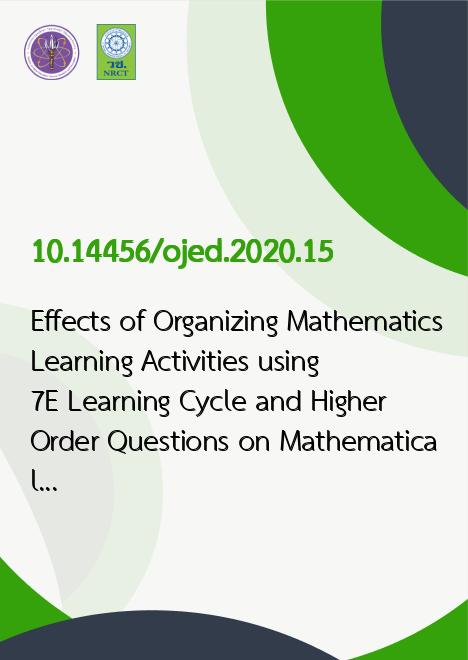
|
Effects of Organizing Mathematics Learning Activities using 7E Learning Cycle and Higher Order Questions on Mathematical Problem-Solving Ability of Seventh Grade Students |
|---|---|
| รหัสดีโอไอ | |
| Creator | Susiriya Thirakulnanchai |
| Title | Effects of Organizing Mathematics Learning Activities using 7E Learning Cycle and Higher Order Questions on Mathematical Problem-Solving Ability of Seventh Grade Students |
| Contributor | Jinnadit Laorpaksin |
| Publisher | Centre for Education Innovation, Print and Online Media |
| Publication Year | 2563 |
| Journal Title | An Online Journal of Education, Chulalongkorn University |
| Journal Vol. | 15 |
| Journal No. | 2 |
| Page no. | OJED1502008 (13 pages) |
| Keyword | 7e learning cycle, higher order questions, mathematical problem-solving ability |
| URL Website | https://so01.tci-thaijo.org/index.php/OJED |
| Website title | An Online Journal of Education, Chulalongkorn University |
| ISSN | ISSN 1905-4491 (Online) |
| Abstract | The purposes of this research were 1) to compare mathematical problem-solving ability of students before and after using the 7E learning cycle with higher order questions learning activities, and 2) to study the ability to solve mathematical problems both in general and according to the sub - components of the students receiving mathematics learning activities using the 7E learning cycle with higher order questions classified by skill levels: high-achieving average-achieving and low-achieving groups between, before and after studying. The subjects of this paper consisted 35 students in an experimental group of seventh graders of an exceptionally large school in Pathum Thani during the second semester of academic year 2019 using purposive sampling. The instrument for data collection was the use of the mathematical problem-solving ability test. The data obtained were analyzed by using arithmetic mean, standard deviation, percentage, t-test, and content analysis.The results of the study revealed that 1) the mathematical problem-solving ability of students in the experimental group was higher than that of before the experiment at a .05 level of significance, and 2) the mathematical problem-solving ability of students in the experimental group improved in a positive direction for all aspects, especially understanding of mathematical problem-solving ability, and the average-achieving group showed the most development in understanding of mathematical problem-solving. |